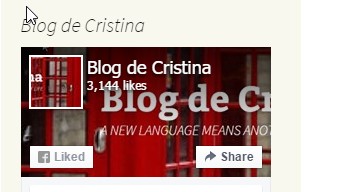For the past few days I have been thinking about possible situations where my students could use the Past Continuous. But, by far, the funniest one has been this one I’m about to tell you.
Bear in mind before going on reading that I work with teenagers. They can sometimes get quite emotional so I have to be careful not to push them too far so that they also enjoy the activity. Drama, on my side, is essential or they won’t buy my story. The more drama, the more fun you’ll get! This is my story and I have realised I love being naughty!!
not to push them too far so that they also enjoy the activity. Drama, on my side, is essential or they won’t buy my story. The more drama, the more fun you’ll get! This is my story and I have realised I love being naughty!!
 (Going into the classroom with a gloomy face is a must for this story. Say nothing for a while and stare at them. Soon students will begin to feel uneasy and someone will eventually ask: “What’s wrong, teacher?”).
(Going into the classroom with a gloomy face is a must for this story. Say nothing for a while and stare at them. Soon students will begin to feel uneasy and someone will eventually ask: “What’s wrong, teacher?”).
Well, you see! Yesterday afternoon I came to Grado (name the town where you teach) to do some shopping and a very unpleasant thing happened to me. (sad face and some more staring) . While I was leaving a shop (name the shop for realism) I heard a boy and a girl calling my name and running away. I couldn’t see their faces but I think I recognised their voices. When I went over to my car I realized someone had scratched my car with a key. That’s why I’m so sad. “Sara, the girl’s voice sounded just like yours!” ” Oh, no, no teacher” “What were you doing yesterday at 5 o’clock?” “I was doing my homework at home” and you David “Were you in Grado yesterday afternoon? Yes , but I was playing a football match!
As I said : I love being NAUGHTY!
 Internet is not a difficult word to learn. Why should I, then, dedicate a post to the word Internet? Come to think of it this post might be only meaningful to Spanish students as they are the ones who make the most mistakes when using this word in context. Why? For these two reasons.
Internet is not a difficult word to learn. Why should I, then, dedicate a post to the word Internet? Come to think of it this post might be only meaningful to Spanish students as they are the ones who make the most mistakes when using this word in context. Why? For these two reasons. and cannot be recognised. “
and cannot be recognised. “


